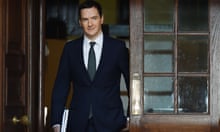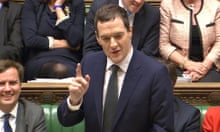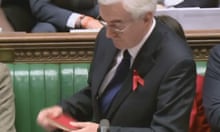George Osborne executed a U-turn on planned cuts to tax credits, using an unexpected £27bn fiscal windfall in a bid to defuse a damaging political row.
The chancellor had promised to modify his plan, which would have cost low-income families an average of £1,000 a year, after a rebellion in the Lords and among his own MPs.
As he delivered his autumn statement on Wednesday, Osborne claimed to have listened to concerns about the changes and decided “the simplest thing to do is not to phase these changes in but to avoid them altogether”.
He said higher than expected tax revenues and lower interest payments on government debt had opened up an extra £27bn of fiscal wriggle room, which will be used to cancel the tax credit plans and ease back on the scale of spending cuts in other areas.
The reversal of tax credit cuts is not just an embarrassing climbdown since he introduced the plans four months ago. It also means the chancellor breaches his self-imposed welfare cap, which was meant to limit the cost of social security. Osborne said he would still cut £12bn from the welfare bill, but would do so “in a way that helps families, as we make the transition to our national living wage”.
However, Labour claimed the plans would still take £1bn from working families next year and more than £3bn by the end of the parliament as the new universal credit system comes in. Osborne is also still limiting child tax credit entitlements to a family’s first two children from 2017 as planned.
“This is a smoke-and-mirrors spending review from George Osborne, leaving working people worse off and failing to address the big challenges facing the country,” said Owen Smith, the shadow work and pensions secretary.
“As a result, a single parent of two children working full time on the minimum wage on universal credit will lose £2,400 next year due to the chancellor’s cuts.”
The Treasury disputed the idea that it was only partially reversing the tax credit cuts, saying the proposed changes were being ditched in full.
On top of the tax credit reversal, the chancellor surprised the House of Commons by pledging not to cut spending on frontline police – having repeatedly refused to confirm this would be protected in the wake of the Paris terror attacks.
“Now is not the time for further police cuts. Now is the time to back our police and give them the tools to do the job,” he said.
John McDonnell, the shadow chancellor, claimed Osborne’s change of heart on both issues was a “victory for Labour”.
However, the detail of the spending review contained a host of other politically controversial cuts and tax rises that will start to take effect over the next four years. These include:
- A 56% cut in local authority grants from central government, alongside new powers for councils to raise their own money from business rates and a special 2% precept to pay for social care.
- Raising an extra £1bn a year by 2020 from a new 3 percentage-point stamp duty charge on buy-to-let properties and second homes.
- An end to grants for student nurses, who must now pay for their own training with the help of loans. The cap on recruitment of student nurses will be lifted.
- Higher student loan repayments for people who have graduated since 2012 and will have to pay about £300 a year more.
- A £15m boost for women’s charities to be paid for from the so-called “tampon tax” – the VAT levied on sanitary products.
- A cap on housing benefit rates in the social housing sector, limiting them to the same rate as private-sector housing benefit rates.
- A 19% cut in state funding for opposition parties.
- An overhaul of schools funding to even out regional variations and cuts to the further education budget that will mean funding per student for 16- to 19-year-olds in sixth forms and colleges is cut by 9.4% by 2020.
Overall, Osborne said the £12bn of cuts to government departments would help move Britain “out of the red and into the black”. He promised that efficiency savings and changes in the way Britain is governed would allow the Treasury to continue investing in protected areas including health and education.
The Treasury will still target a £10bn surplus on the public finances by the end of this parliament, as stated in Osborne’s July budget. The latest forecasts show a £73.5bn deficit in the current financial year, dipping to a shortfall of just £4.6bn in 2018-19, and turning into a surplus of £10.1bn by 2019-20.
Many departments will face deep cuts in their budgets for day-to-day spending: 37% for the Department for Transport, 15% for Department for Environment, Food and Rural Affairs and 17% at the Department for Business, Innovation and Skills.
However, the chancellor stressed that capital budgets for longer-term projects would be protected, allowing him to promise the biggest road-building programme since the 1970s, and more funding for investment in innovative energy technologies, for example.
Public debt is now expected to fall from 82.5% of GDP this year to 81.7% in 2016-17, and to continue declining until the end of the parliament, reaching 71.3% in 2020-21.
The chancellor announced the independent Office for Budget Responsibility’s latest forecasts for the economy. GDP growth is expected to expand by 2.4% in 2015, unchanged from the July projection; by 2.4% in 2016, marginally up from the 2.3% the OBR was expecting in the summer; and by 2.5% in 2017.
Women’s charities will receive £15m a year from the so-called “tampon tax” – the VAT levied on sanitary products – and the sports budget at the Department for Culture, Media and Sport is set to increase by 29%, allowing Britain to “go for gold” at the Rio Olympic Games. The Foreign Office’s budget will be protected in real terms.








Comments (…)
Sign in or create your Guardian account to join the discussion